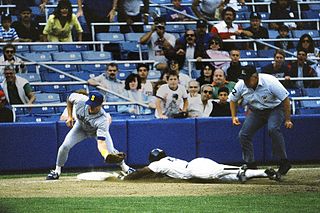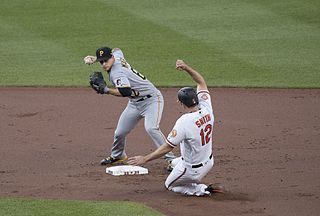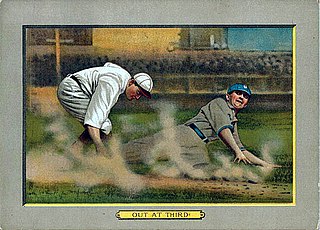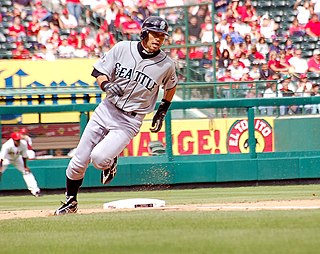Baseball statistics play an important role in evaluating the progress of a player or team.

In baseball, a stolen base occurs when a runner advances to a base to which they are not entitled and the official scorer rules that the advance should be credited to the action of the runner. The umpires determine whether the runner is safe or out at the next base, but the official scorer rules on the question of credit or blame for the advance under Rule 10 of the MLB's Official Rules.
In baseball, fielder's choice refers to a variety of plays involving an offensive player reaching a base due to the defense's attempt to put out another baserunner, or the defensive team's indifference to his advance. Fielder's choice is not called by the umpires on the field of play; rather, it is recorded by the official scorer to account for the offensive player's advance without crediting him with an offensive statistic such as a hit or stolen base.

In baseball and softball, a double play is the act of making two outs during the same continuous play. Double plays can occur any time there is at least one baserunner and fewer than two outs.

Catcher is a position for a baseball or softball player. When a batter takes their turn to hit, the catcher crouches behind home plate, in front of the (home) umpire, and receives the ball from the pitcher. In addition to this primary duty, the catcher is also called upon to master many other skills in order to field the position well. The role of the catcher is similar to that of the wicket-keeper in cricket, but in cricket, wicketkeepers are increasingly known for their batting abilities.

A first baseman, abbreviated 1B, is the player on a baseball or softball team who fields the area nearest first base, the first of four bases a baserunner must touch in succession to score a run. The first baseman is responsible for the majority of plays made at that base. In the numbering system used to record defensive plays, the first baseman is assigned the number 3.

In baseball, an out occurs when the umpire rules a batter or baserunner out. When a batter or runner is out, they lose their ability to score a run and must return to the dugout until their next turn at bat. When three outs are recorded in a half-inning, the batting team's turn expires.

The rules of baseball differ slightly from league to league, but in general share the same basic game play.
In baseball, interference occurs in situations in which a person illegally changes the course of play from what is expected. Interference might be committed by players on the offense, players not currently in the game, catchers, umpires, or spectators. Each type of interference is covered differently by the rules.
A hit and run is a high risk, high reward offensive strategy used in baseball. It uses a stolen base attempt to try to place the defending infielders out of position for an attempted base hit.

Baseball scorekeeping is the practice of recording the details of a baseball game as it unfolds. Professional baseball leagues hire official scorers to keep an official record of each game, but many fans keep score as well for their own enjoyment. Scorekeeping is usually done on a printed scorecard and, while official scorers must adhere precisely to one of the few different scorekeeping notations, most fans exercise some amount of creativity and adopt their own symbols and styles.
This is an alphabetical list of selected unofficial and specialized terms, phrases, and other jargon used in baseball, along with their definitions, including illustrative examples for many entries.

In baseball, base running is the act of running from base to base, performed by members of the team at bat.








